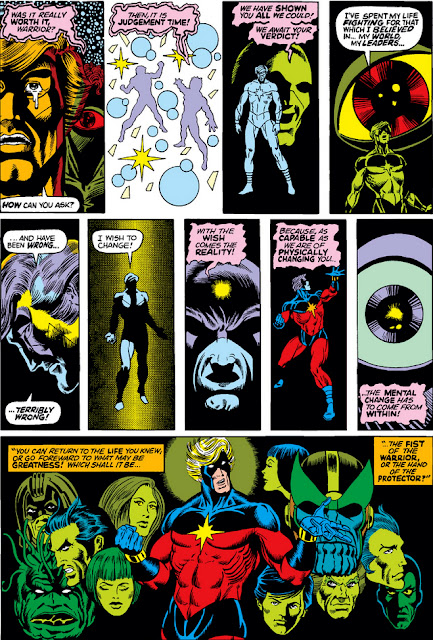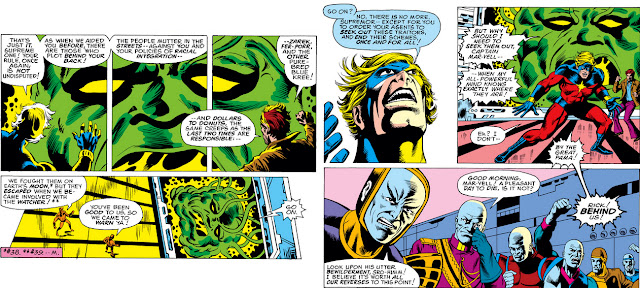It was after Captain Marvel and Rick Jones had wrapped up their involvement in the trial of the Watcher that the pair returned to Earth and resumed their own separate lives. For Rick, that meant attempting to pick up the pieces of his performing career; but as for Mar-vell, he would take a respite and say his farewells to comrades and friends before leaving Earth for his homeworld of Hala to report to the Kree Supreme Intelligence on the activities of the renegade Kree who called themselves the Lunatic Legion, as well as, for all intents and purposes, formalizing the end of his original mission on Earth and taking his place once more as a Kree.
Yet it struck me as a curious--and, frankly, implausible--pivot for the character on the part of writer Steve Englehart. After all, this was the same Captain Marvel who emerged as one with the universe following a reckoning with his past initiated by the being called Eon:
And yet, thanks to narrative that elbows aside those new convictions with a simple "But that's in the past!", he's now ready and willing to return to the Kree, a conquering race that embraces war as a way of life, and... what? Somehow remain neutral? Reclaim his former rank in title only? Restrict himself to the service of the Supreme Intelligence which groomed him and accorded him honor? What does "taking my place as a Kree once more" mean, exactly--and how does the "protector" Mar-vell not find the concept of rejoining the people and way of life he walked away from abhorrent?
And there is one other person to consider here: Rick Jones, who at this point in time can merge his being with that of Mar-vell to capitalize on their joint power and still separately enjoy a life of his own, but who upon returning to Earth found himself behind the times both personally and professionally and decided to accompany Mar-vell to Hala, a terran on a world whose people despise terrans. Neither of these men seem to have thought this through--though Mar-vell may be mistaken in assuming that their esteem with the Supreme Intelligence will smooth things over with the rest of the Kree.
And speaking of the Intelligence (the manifestation of the greatest Kree minds over a period of centuries), the sight of him is as impressive as ever--but both Mar-vell and Rick are in for a rude awakening in terms of their expectations of his reaction to news of the traitors whom they've come to report on, as they discover that the Intelligence knows all too well of the Legion's whereabouts.
(NOTE TO EON: Cosmic awareness defective--cannot detect six enemies within the same chamber closing in from behind. PLEASE RECOMPILE AND REFIT AT EARLIEST CONVENIENCE. -- C.M.)
Fortunately, to Mar-vell's and Rick's credit, they make a pretty good team, as they've proven often enough--and, joined, an almost unstoppable fighter. When the dust settles, it's time for answers--only for Mar-vell to learn that the Intelligence is just as fond of war for his own sake as the rest of the Kree, particularly when it comes to self-preservation and the acquisition of power.
(FOLLOW-UP TO EON: Would have been helpful to have cosmic awareness reveal the hidden machinations of the Intelligence going in, rather than my enemy having taunted me that I was ignorant of his grand design. Am I one with the universe or not!? PLEASE DEBUG C.A. AND REFIT! -- C.M.)
Incensed at the deception, Mar-vell attempts a direct attack on the Intelligence, only to be rebuffed--and the Intelligence has one more resource to make use of, a figure who at one time had turned against him but no longer has that option.
Their new operational status has further muddied the waters of Mar-vell's and now Rick's power thanks to their new matching set of nega-bands. As they move to bring down Ronan, the development appears to have given even the Intelligence pause, to the extent of relocating the heroes and no doubt cogitating further on just how and when he'll finally triumph.
In Part Two of this ongoing story, Englehart varies its pace somewhat and brings a bit of the old west to a distant asteroid, in a tale which finally answers the question: How fast can the Stranger "draw"?
in the pages of Warlock has spread to Hala.

















9 comments:
I suspect the Christmas line means that Rick only goes to church at Christmas.
That's certainly plausible, Jonathan, thanks!
"How does Mar-vell not find the concept of rejoining the people and way of life he walked away from abhorrent?"
Well, it is where he's from Comicsfan, and I think you may be taking too much of a black and white view of a complex society.
Perhaps it might be useful to compare Mar-vell with the Americans who went to Canada or Europe to avoid the draft during the Vietnam war. Some of them were very critical of the US at the time, objecting to what they saw as an aggressive power... yet it doesn't follow that their views of their country were entirely - or even mostly - negative, and they generally returned when they could.
Actually, come to think of it, this story would have appeared around the time of Ford's amnesty for dodging the draft - I think that was a couple of years before the eventual pardon? - which may not be entirely coincidental (the social turmoil of the Vietnam era does strike me as an obvious subtext to Jim Starlin and Steve Englehart's Captain Marvel).
No special explanation is needed for Rick Jones of course - if you're dumb enough to hang around a gamma bomb test site playing harmonica, going to a planet where they despise terrans is entirely in character...
-sean
Given their history and military bent, I don't know if the situation is all that complex where the Kree are concerned, sean. In fact, Rick may have put it best: "The Kree dig war." Nor was Mar-vell speaking of mere energy infrastructure when he observed that "nothing grows [on the Kree homeworld] save power," referring to the Kree as a race bent on conquest and supremacy. These conquerors amassed a massive galactic empire by force of arms and will, with Mar-vell fully on board with that mindset until his time on Earth--a change of direction for him solidified even more by his encounter with Eon, where he chose and embraced a completely different life for himself. Returning to report to the Intelligence on the activities of the Legion is understandable, since his impression of the Supremor (there's that "supreme" reference again) was as an entity that would rein in such elements--but returning to take his place as a so-called "man of the Kree"? It's a contradiction that, in my opinion, can't be reconciled with the man that Starlin presented to us.
Oh come on CF, what does Rick know?
And maybe Mar-vell was making a political point, and shouldn't be taken literally?
Englehart's Captain Marvel attempted to present the Kree as a complex society rather than simply a race of two-dimensional comic book villains.
The Lunatic Legion for instance were a reactionary group, believing themselves to be the 'true' blue Kree, and were against the mix of different peoples that had taken place in the empire over time. Which not only implies a variety of views, but that theirs were in the minority.
Iirc, the Legion considered the Supreme Intelligence to be a 'cesspool of impure minds' and 'a liberal'...
-sean
"What does Rick know?" Sean, Rick has all too much experience with the Kree, and every experience is with the blue boobs trying to destroy Earth. Not threats coming from some rogue Kree element, but coming from the very top of the command structure. Perhaps that experience has given him a biased view, but it's factual.
And the draft dodger analogy is intriguing, but incorrect. Mar-vell was a veteran officer who 1) went AWOL and 2) didn't just leg it for the hills, but actively sought to hamstring the Kree mission. "Traitor", for lack of any other word. Even an official pardon doesn't Febreze that stink away easily.
Having factions may give the Kree some complexity, but all the factions appear to have a core value system of "WAR". I cite the Priests of Pama, a fringe element of Kree who had the audacity to choose to be pacifists. So intensely persecuted were these folks that they had to scatter to distant spots in the middle of nowhere (ie: Earth) to live as they pleased. (they almost sound like they'd fit your draft dodger idea)
Rick's experience with the Kree wouldn't necessarily be all there was to them Murray.
Being of the Irish persuasion I've been known to be dismissive of the British as aggressive. I could say I've had plenty of experience with them, and that theres a factual basis for that - hey, its not that long ago historically speaking that they had an empire (which they didn't get by being nice to people) - but of course its still no way to talk about a whole society of people really.
So I think Englehart was just trying to write about an alien society in a more nuanced way. Personally I find that to be more interesting than the two-dimensional villains you get with earlier comics.
-sean
Some fantastic art in those Capt. Marvel books ...!
There were so many inkers for this particular issue, Super, that it's hard to know who to appreciate for the end result, but I've always enjoyed Milgrom's work on the CM book overall.
Post a Comment